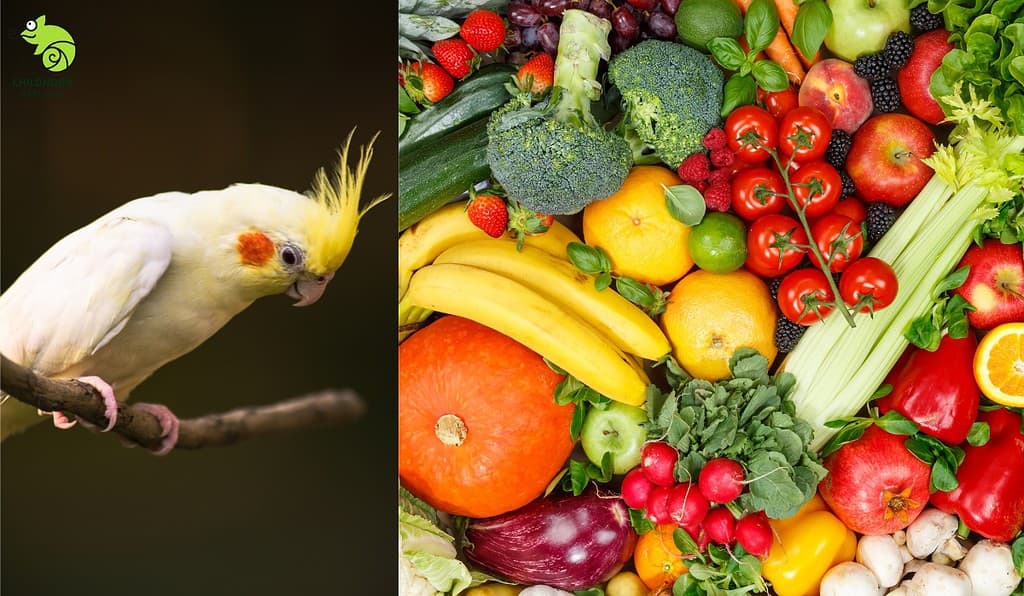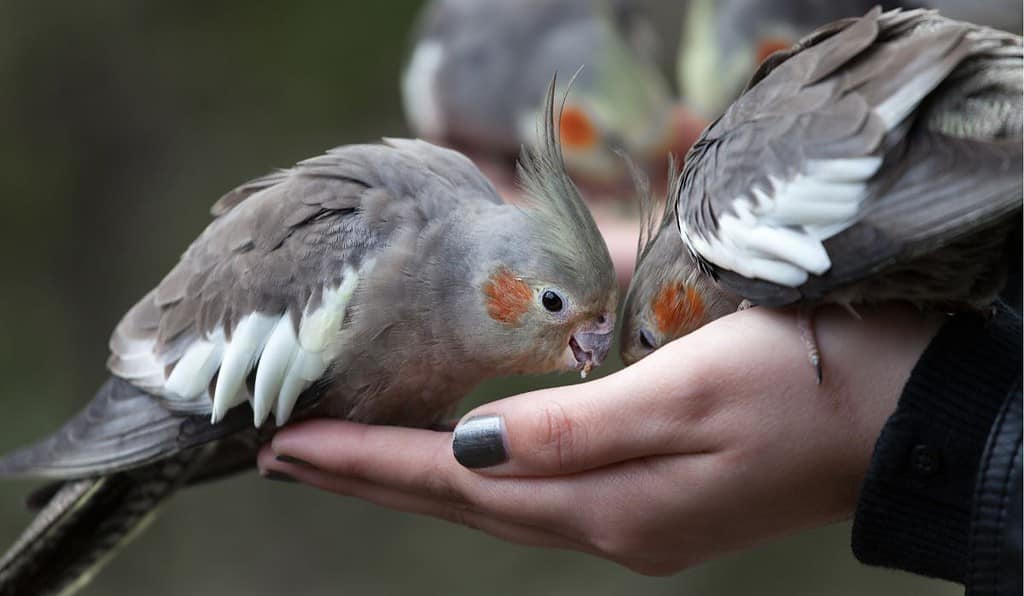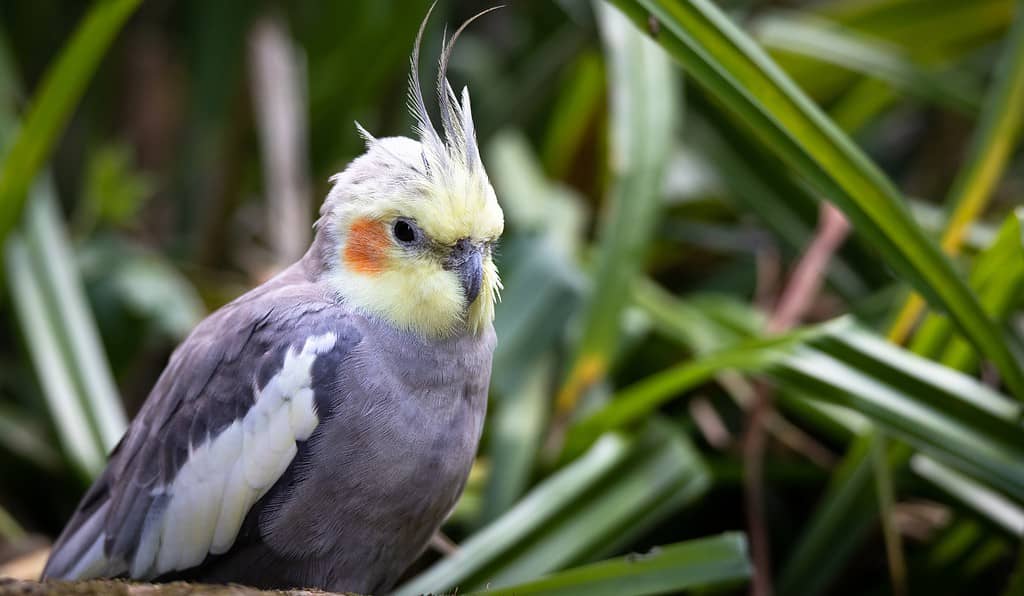
In the world of feathers and chirps, the delightful cockatiel makes a charming companion. Their vibrant personalities and affectionate nature have won the hearts of many, but like all creatures, they thrive best with proper nourishment. Ensuring a balanced diet for your cockatiel is paramount for their health and happiness. The question that looms large for every cockatiel owner is, what is the best food for these feathered friends?
As a whole, cockatiels flourish with a varied diet of seeds, fresh fruits, and vegetables, supplemented with high-quality proteins. Avoid foods like chocolate, avocado, and certain seeds which are toxic to these birds.
Curious about the specifics? Wondering about the signs of food poisoning in cockatiels or how often and how much to feed them? As we flutter through this guide, you’ll gain insights into ensuring your cockatiel’s diet is not just filling, but also nutritious and safe. Let’s embark on this journey of discovery together, ensuring your feathered friend’s diet makes them chirp in delight!
What is a Cockatiel’s Favorite Food?
Cockatiels have a penchant for a variety of foods, but they can be quite picky, especially when trying something new. It’s essential to introduce a mix of fresh fruits and veggies early on to ensure a balanced diet.
Cockatiels enjoy a varied diet, but their favorite foods often include seeds, particularly millet. They also love fresh fruits, vegetables, and grains. It’s essential to provide a balanced diet for optimal health and avoid avocado, chocolate, and caffeine, which are toxic to birds.
Here’s a list of some foods that cockatiels commonly love:
- Apples: A rich source of vitamins, ensure to remove the seeds before feeding.
- Grapes: High in vitamins and can enhance immunity, but moderation is key.
- Mangoes: Packed with Vitamin C and A, a small portion every few days is ideal.
- Bananas: Loved by cockatiels, but should be given as a snack due to high sugar content.
- Coconut: An occasional treat, filled with fiber, protein, and various nutrients.
Incorporating these foods into your cockatiel’s diet will not only tantalize their taste buds but also provide a plethora of nutrients essential for their health and happiness. Remember, the key is variety and moderation. Now, let’s flutter forward and explore the different types of cockatiel diets in the upcoming sections.
Types of Cockatiel Diets
Navigating the world of cockatiel nutrition can be a bit like navigating a maze. But don’t fret! I’ve been down this path countless times, and I’m here to guide you. Let’s dive deeper into the different diets you can offer your cockatiel.
Seed-Based Diet

Seeds are a natural choice for many bird owners, and for a good reason. They’re readily available and often loved by our feathered friends. But like all things, they come with their pros and cons.
Pros:
- Natural Source: Seeds are a natural part of a bird’s diet in the wild.
- Variety: Different seeds offer various nutrients.
- Taste: Most cockatiels love the taste of seeds.
Cons:
- Nutritional Imbalance: Relying solely on seeds can lead to deficiencies.
- High Fat: Some seeds are high in fat, which can lead to obesity.
- Selective Eating: Cockatiels might pick out their favorite seeds and ignore others, leading to an imbalanced diet.
Nutritional Elements of Different Seeds:
| Seed Type | Protein | Fat | Fiber |
| Poppy | Medium | High | Low |
| Sesame | High | High | Medium |
| Flax | High | Medium | High |
| Canary Grass | Low | Low | Medium |
| Sunflower | Low | Very High | Low |
Pellet-Based Diet
Pellets are a more recent addition to the bird food market, designed to provide a balanced diet.
Pros:
- Balanced Nutrition: Pellets are formulated to offer a balanced diet.
- Less Waste: Unlike seeds, there are no hulls left behind.
- Consistency: Ensures the bird gets all the nutrients without being selective.
Cons:
- Acceptance: Some cockatiels might resist the change from seeds to pellets.
- Quality: Not all pellets are created equal. Some might have fillers or low-quality ingredients.
- Lack of Variety: A solely pellet-based diet can be monotonous for the bird.
Mixed Diet
A mixed diet, combining seeds, pellets, and fresh foods, is like hitting the nutritional jackpot for your cockatiel. It’s like offering a buffet of flavors, textures, and nutrients, ensuring your bird gets a well-rounded intake.
Benefits of a Mixed Diet:
- Nutritional Diversity: A mixed diet offers a wide range of nutrients, ensuring your cockatiel gets everything it needs for optimal health.
- Taste Satisfaction: The variety keeps mealtime exciting and satisfying for your bird.
- Behavioral Enrichment: Different foods offer various textures and shapes, providing mental stimulation and beak exercise.
- Flexibility: It allows you to adjust the diet based on your bird’s health, age, and preferences.
- Health and Longevity: A balanced diet contributes to overall health, vitality, and longevity.
But remember, balance is the key. Ensure the diet is predominantly made of high-quality pellets, supplemented with seeds, fresh fruits, and vegetables. Regularly monitor your cockatiel’s health and adjust the diet as needed. Consult your vet for personalized dietary recommendations for your feathered friend.
Safe and Healthy Treats for Cockatiels

As we embark on this journey of understanding the ideal diet for cockatiels, let’s delve into the world of safe and healthy treats for these delightful birds. Ensuring a varied and nutritious diet is paramount for their well-being.
Fruits Cockatiels Can Eat
- Apples: A perfect addition to a cockatiel’s diet, rich in vitamins (A, B6, and C), potassium, magnesium, and fiber. Ensure the seeds are removed.
- Grapes: Enhance a cockatiel’s immunity and are rich in vitamin K and B6. Feed only fresh and organic grapes, and limit to a grape or two per week.
- Mango: Provides a lot of vitamins C and A, essential for a cockatiel’s health. Offer 1/8th of a mango every few days.
- Bananas: Loved by cockatiels, bananas are nutritious but should be fed in moderation due to high sugar content.
- Coconut: An occasional treat, coconuts are nutrient-rich and beneficial for cockatiels.
- Papaya: Rich in Vitamin E, A, and C, papayas are healthy in small quantities.
- Oranges: A great source of vitamin C. Remove the seeds and avoid the peel.
- Pumpkin: Safe and a source of several important vitamins and minerals.
- Watermelon: Ensure the rind and seeds are removed before feeding.
Each fruit brings its own set of nutrients and benefits, contributing to the overall health and happiness of your cockatiel. Remember to introduce these fruits gradually and observe your bird for any allergic reactions or dislikes.
Vegetables for Cockatiels
- Spinach: Rich in vitamins A, B, C, and K, and minerals like calcium and iron. However, feed in moderation due to its high oxalic acid content.
- Peas: Provide a lot of protein. Can be fed both raw and cooked.
- Sweet Potatoes: Full of vitamins, minerals, and antioxidants, offering better digestion, stronger immunity, and healthy feather growth.
- Corn: Loved by cockatiels for its texture and taste, it is rich in fiber and vitamins A, B, C, and K.
- Lettuce: A perfect treat for cockatiels, providing fiber, potassium, and vitamins A, C, and K.
- Carrots: Great for their health, rich in carbohydrates, vitamin K, vitamin A, calcium, and beta carotene.
- Cucumber: Offers a variety of vitamins and minerals and is a substantial source of fresh water for birds.
Including these vegetables in your cockatiel’s diet will ensure they receive a balanced diet rich in all the necessary nutrients. Remember to wash all vegetables thoroughly and serve them raw or lightly steamed to retain their nutritional value. Your cockatiel’s health and vitality will flourish with these nutritious additions to their diet.
Supplements for Cockatiels
It’s crucial to understand when and why supplements are needed and how to choose the right ones for your beloved pet.
Do Cockatiels need Supplements?
Supplements can be a crucial part of a cockatiel’s diet, especially when specific nutritional needs aren’t met through their regular diet. Situations where supplements might be necessary include:
- Molting: During this period, birds need extra nutrients to grow new feathers.
- Breeding: Female cockatiels require additional calcium and vitamins during breeding.
- Illness: Recovering birds may need a nutritional boost.
- Dietary Imbalance: If the regular diet is lacking in nutrients, supplements can fill the gap.
Choosing the Right Supplements
| Supplement | Benefits |
| Calcium | Essential for strong bones and egg production |
| Vitamin A | Promotes good vision and a healthy immune system |
| Vitamin D | Aids in calcium absorption and bone health |
| Probiotics | Supports digestive health |
| Amino Acids | Essential for feather and muscle development |
When selecting supplements, ensure they are specifically designed for birds, and consult your avian vet for the right dosage and type. It’s essential to monitor your cockatiel’s health and adjust the supplements accordingly. Over-supplementation can be harmful, so it’s crucial to follow the vet’s advice and provide a balanced diet alongside supplements.
Hydration for Cockatiels
Navigating through the maze of cockatiel care, we now turn our focus to a fundamental aspect – hydration. The essence of water in a cockatiel’s diet is as crucial as the food they consume, ensuring their bodily functions operate seamlessly.
Importance of Fresh Water
Providing fresh and clean water to your cockatiel is paramount. It aids in digestion, keeps your bird hydrated, and is essential for various biological processes. Ensuring a constant supply of fresh water helps in maintaining the overall health and vitality of your cockatiel, preventing dehydration and associated health issues.
Safe and Unsafe Water Sources
When it comes to water sources, it’s vital to discern the safe from the unsafe to ensure the well-being of your cockatiel.
Safe Water Sources:
- Filtered Water
- Spring Water
- Tap Water (ensure it’s free from heavy metals and chlorine)
Unsafe Water Sources:
- Unfiltered Water from Lakes or Ponds
- Water with Added Artificial Flavors or Sugars
Ensuring your cockatiel has access to clean and uncontaminated water is a step towards a healthy and happy bird, safeguarding them from potential water-borne diseases.
Seasonal Feeding for Cockatiels
As the seasons change, so do the dietary needs of your cockatiel. Adapting their diet according to the seasons is essential for maintaining their health and well-being.
Adjusting Diet According to Seasons
In the warmer months, ensure your cockatiel has ample fresh water and include more fresh fruits and vegetables in their diet to keep them hydrated. During colder months, focus on providing foods that are high in energy to help them maintain their body temperature. Regularly monitor your cockatiel’s health and adjust their diet as needed to ensure they are getting the necessary nutrients.
Seasonal Foods for Cockatiels
- Spring:
- Fresh greens like spinach and lettuce
- Berries and other fresh fruits
- Summer:
- Water-rich vegetables like cucumber
- Melons and other hydrating fruits
- Fall:
- Squash and pumpkins
- Apples and pears
- Winter:
- High-energy foods like seeds and nuts
- Cooked vegetables like sweet potatoes
Adjusting the diet and including seasonal foods not only provides nutritional variety but also introduces your cockatiel to different flavors and textures, contributing to their overall happiness and well-being. Remember, a happy and healthy cockatiel is a joy to have around, filling your days with chirpy melodies and vibrant energy!
Dangerous Foods for Cockatiels
Navigating the world of cockatiel nutrition can be a maze, but it’s crucial to know what’s safe and what’s not. Let’s delve into the foods that can be harmful to your feathered friend.
Foods That Are Toxic to Cockatiels
- Chocolate: Highly toxic to birds, can cause serious health issues.
- Caffeine: Can cause cardiac malfunction in cockatiels.
- Avocado: Contains persin, a fungicidal toxin lethal to birds.
- Alcohol: Can cause serious health issues and is not suitable for birds.
- Onions and Garlic: Contain sulfur and allicin, which are toxic to birds.
- Fruit Pits and Apple Seeds: Contain a cardiac-toxic cyanide compound.
- Chinese Cinnamon (Cassia Bark): Has high doses of coumarin, a known toxic substance for pet birds.
Each of these foods can cause serious harm to your cockatiel, leading to health complications or even death. It’s essential to keep these foods away from your bird and focus on providing a balanced diet rich in safe fruits, vegetables, and seeds.
Signs of Food Poisoning in Cockatiels
If your cockatiel ingests toxic foods, it’s crucial to recognize the signs of food poisoning. Symptoms may include vomiting, diarrhea, lethargy, loss of appetite, and difficulty breathing. In such cases, immediate veterinary attention is essential to ensure the health and safety of your bird. Your vet can administer the necessary treatments, such as activated charcoal to absorb the toxins, and provide supportive care to help your cockatiel recover.
Feeding Guidelines for Cockatiels
As we transition into the realm of feeding guidelines, remember that a balanced diet is the cornerstone of good health for your cockatiel. Proper feeding ensures your bird gets the necessary nutrients for a healthy and active life.
How Often and How Much to Feed
Feeding your cockatiel should be a daily routine, providing fresh food and water every day. Adult cockatiels typically eat about two tablespoons of a seed and pellet mix daily, along with fresh fruits and vegetables. Adjust the quantity based on your bird’s size, age, and activity level, and always monitor their weight and overall health.
Tips for Introducing New Foods
- Start Small: Introduce new foods in small amounts to monitor your bird’s reaction.
- Be Patient: Some cockatiels may be hesitant to try new foods, so give them time to adjust.
- Mix with Favorite Foods: Combine new foods with your cockatiel’s favorite treats to encourage them to try them.
- Ensure Proper Size: Cut foods into manageable pieces for your cockatiel to eat comfortably.
- Observe and Adjust: Keep an eye on your bird’s response and make adjustments as needed.
Conclusion
Did you find this guide helpful in navigating the nutritional needs of your cockatiel? Understanding the foods that are toxic to cockatiels, recognizing the signs of food poisoning, and following proper feeding guidelines are essential for keeping your feathered friend healthy and happy.
- What was the most surprising toxic food for you?
- How do you plan to adjust your cockatiel’s diet based on this information?
- Any other concerns or questions about your cockatiel’s nutrition?
Feel free to share your thoughts and experiences in the comments below, and don’t hesitate to share this article with fellow cockatiel enthusiasts. Your bird’s health and well-being are worth it!
